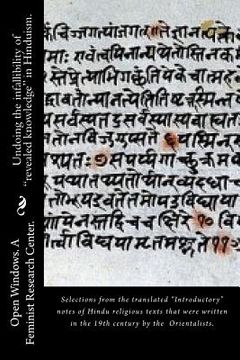Compartir
Undoing the infallibility of "revealed knowledge" in Hinduism.: Selections from the translated "Introductory" notes of Hindu religious texts that were (en Inglés)
Open Windows Feminist Research Center
(Autor)
·
Lies and Big Feet
· Tapa Blanda
Undoing the infallibility of "revealed knowledge" in Hinduism.: Selections from the translated "Introductory" notes of Hindu religious texts that were (en Inglés) - Feminist Research Center, Open Windows
$ 12.270
$ 24.540
Ahorras: $ 12.270
Elige la lista en la que quieres agregar tu producto o crea una nueva lista
✓ Producto agregado correctamente a la lista de deseos.
Ir a Mis Listas
Origen: Estados Unidos
(Costos de importación incluídos en el precio)
Se enviará desde nuestra bodega entre el
Jueves 11 de Julio y el
Jueves 18 de Julio.
Lo recibirás en cualquier lugar de Chile entre 1 y 3 días hábiles luego del envío.
Reseña del libro "Undoing the infallibility of "revealed knowledge" in Hinduism.: Selections from the translated "Introductory" notes of Hindu religious texts that were (en Inglés)"
A manuscript culture within the Indian context meant that religious texts were always spurious and quite unstable; what becomes evident is that different manuscripts had different versions of the same text. These religious texts also had commentaries which the scribe would have made. There is ample documentation on how these manuscripts were written; the East India Company scholars (in the 19th C.) and Western Orientalists who were involved in translating these religious texts have examined the variants that existed and how the manuscripts differed from each other. They keep on referring to how they had to "collate" different manuscripts and how these hand written texts had errors and side notes; the job of these Orientalist scholars was to come up with a perfect version of the text and have it printed - without errors. This, in turn, refers to the process of how manuscripts were written over the centuries in India; the implication is that the Brahmin pandits would have considered it a legitimate act to alter them and reinterpret these hand-written texts. Print technology was intrinsic to the processes of grammatical and textual standardization that took place in the 19th century due to the stringent measures taken by the British Orientalists, whereby the realm of a fluid manuscript culture was altered to allow for perfect texts to emerge; it also erased the editorial process where it was legitimate to constantly edit and amend religious manuscripts. Manuscripts of the Hindu religious texts were often transferred onto print in the early years of print culture in colonial Bengal, India, (i.e. during the last decades of the eighteenth century) under the aegis of the East India Company sponsored Orientalists, but what exactly were the processes involved? How did native-brahmins look upon it as they assisted the Britishers in making the shift take place from a manuscript culture to a realm of print technology? In 1825, Graves Chamney Haughton, a professor of Hindu Literature in the East India College, published an out-of-print text, William Jones's translation of the Sanskrit Manava Dharma Shastra or the Institutes of Manu. Sir William Jones, an employee of the East India Company and referred to as the father of scientific linguistics and comparative philology, is a perfect example of a scholar who worked outside the Orientalist knowledge-making framework. He was also steeped in the culture of eighteenth century British print and had an immense trust in the veracity of printed texts. Haughton's prefatory note states that it was a new edition of Sir William Jones's translation; he writes that in his own text "the version of the learned translator has been carefully revised and compared" and that discrepancies would have been a result of the "variety of the manuscripts consulted by Sir William Jones." This observation provides us with historical documentation that there existed a "variety" of manuscripts that were consulted by these Orientalist scholars as they wrote their versions of the Manusmriti.
- 0% (0)
- 0% (0)
- 0% (0)
- 0% (0)
- 0% (0)
Todos los libros de nuestro catálogo son Originales.
El libro está escrito en Inglés.
La encuadernación de esta edición es Tapa Blanda.
✓ Producto agregado correctamente al carro, Ir a Pagar.

